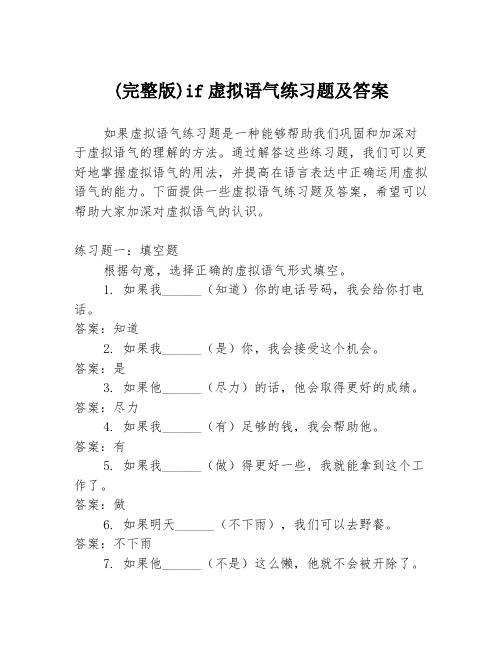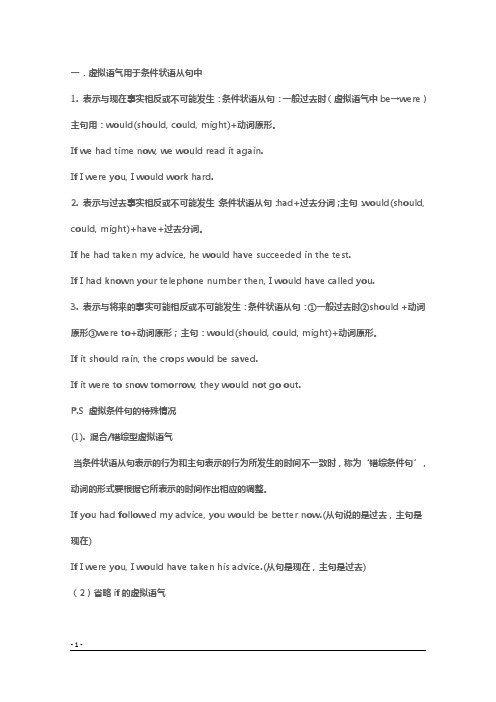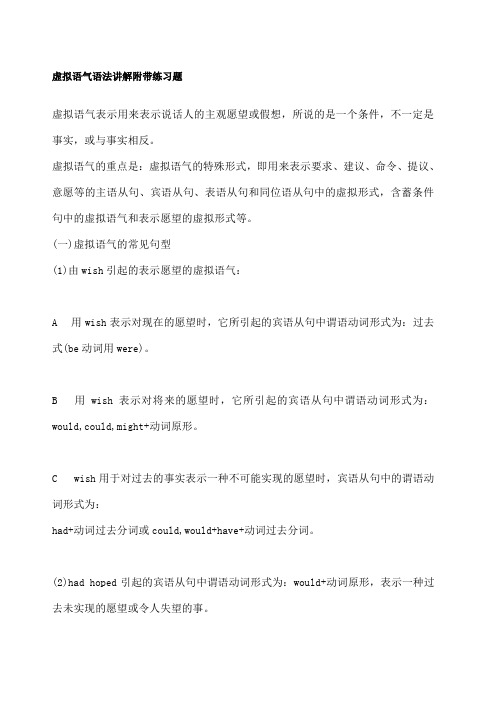(完整版)虚拟语气的用法及专项练习题[1]
虚拟语气解析以及练习题答案详细解答

虚拟语气解析及练习与答案详解虚拟语气一、虚拟语气的运用练习题及答案解释The millions of calculations involved, had they been done by hand,______all practical value by the time they were finished.A.could loseB. would have lostC. might loseD. ought to have lost解析:这个句子中含有一个省略if,把助动词提前到主语they之前的虚拟条件句,该条件句表示对过去情况的假设,而主句中by the time they were finished表明主句也应该是对过去发生的情况的假设,因而应该选(B)would have lost为正确答案。
2. Had Paul received six more votes in the last election, he our chairman now.A. must have beenB. would have beenC. wereD. would be解析:这道题目是一个混合虚拟语气的句子。
条件句省略了if,把助词had提前到主语前面,表示对过去情况的假设,而主句中now表明了对现在情况的假设,所以应选would(should, could, might)+动词原形这种表达形式。
四个选项中只有(D)是正确表达形式,故为正确答案。
3. If you Jerry Brown until recently, you’d think the photograph on the right was strange.A. shouldn’t contactB. didn’t contactC. weren’t to contactD. hadn’t contacted解析:until recently,因此(D)是正确答案,而主句是隐含的对现在情况的假设,该句是一个混合虚拟条件句。
(完整版)if虚拟语气练习题及答案

(完整版)if虚拟语气练习题及答案如果虚拟语气练习题是一种能够帮助我们巩固和加深对于虚拟语气的理解的方法。
通过解答这些练习题,我们可以更好地掌握虚拟语气的用法,并提高在语言表达中正确运用虚拟语气的能力。
下面提供一些虚拟语气练习题及答案,希望可以帮助大家加深对虚拟语气的认识。
练习题一:填空题根据句意,选择正确的虚拟语气形式填空。
1. 如果我______(知道)你的电话号码,我会给你打电话。
答案:知道2. 如果我______(是)你,我会接受这个机会。
答案:是3. 如果他______(尽力)的话,他会取得更好的成绩。
答案:尽力4. 如果我______(有)足够的钱,我会帮助他。
答案:有5. 如果我______(做)得更好一些,我就能拿到这个工作了。
答案:做6. 如果明天______(不下雨),我们可以去野餐。
答案:不下雨7. 如果他______(不是)这么懒,他就不会被开除了。
答案:不是8. 如果你______(去)采取行动,你将失去这个机会。
答案:去9. 如果他______(读)更多的书,他的知识会更丰富。
答案:读10. 如果我______(拥有)魔法,我将会改变世界。
答案:拥有练习题二:选择题选择最佳答案填空。
1. 如果我______(会)弹钢琴,我会给你弹一首歌。
a. 会b. 能c. 可以d. 有答案:a. 会2. 如果你______(是)我,你会怎么做?a. 是b. 是的c. 如果d. 可以答案:a. 是3. 如果明天______(没有)下雨,我们可以去郊游。
a. 没有b. 不下c. 不下雨d. 不来答案:c. 不下雨4. 如果他______(学习)更努力,他会取得更好的成绩。
a. 学习b. 学习了c. 学习过d. 学习到答案:a. 学习5. 如果我______(有)足够的钱,我会买一辆新车。
a. 有b. 拥有c. 会有d. 有着答案:a. 有练习题三:改错题找出下列句子中的错误,并进行改正。
(完整)英语:高考虚拟语气专项练习60题(附答案)(1)

一.虚拟语气用于条件状语从句中1. 表示与现在事实相反或不可能发生:条件状语从句:一般过去时(虚拟语气中be→were)主句用:would(should, could, might)+动词原形。
If we had time now, we would read it again.If I were you, I would work hard.2. 表示与过去事实相反或不可能发生:条件状语从句:had+过去分词;主句:would(should, could, might)+have+过去分词。
If he had taken my advice, he would have succeeded in the test.If I had known your telephone number then, I would have called you.3. 表示与将来的事实可能相反或不可能发生:条件状语从句:①一般过去时②should +动词原形③were to+动词原形;主句:would(should, could, might)+动词原形。
If it should rain, the crops would be saved.If it were to snow tomorrow, they would not go out.P.S 虚拟条件句的特殊情况(1). 混合/错综型虚拟语气当条件状语从句表示的行为和主句表示的行为所发生的时间不一致时,称为‘错综条件句’,动词的形式要根据它所表示的时间作出相应的调整。
If you had followed my advice, you would be better now.(从句说的是过去,主句是现在)If I were you, I would have taken his advice.(从句是现在,主句是过去)(2)省略if的虚拟语气如果从句中含有were/ should/ had时,则可以把这三个词置于句首,省略if.采用倒装语序。
虚拟语气练习

虚拟语气语法讲解附带练习题虚拟语气表示用来表示说话人的主观愿望或假想,所说的是一个条件,不一定是事实,或与事实相反。
虚拟语气的重点是:虚拟语气的特殊形式,即用来表示要求、建议、命令、提议、意愿等的主语从句、宾语从句、表语从句和同位语从句中的虚拟形式,含蓄条件句中的虚拟语气和表示愿望的虚拟形式等。
(一)虚拟语气的常见句型(1)由wish引起的表示愿望的虚拟语气:A用wish表示对现在的愿望时,它所引起的宾语从句中谓语动词形式为:过去式(be动词用were)。
B用wish表示对将来的愿望时,它所引起的宾语从句中谓语动词形式为:would,could,might+动词原形。
C wish用于对过去的事实表示一种不可能实现的愿望时,宾语从句中的谓语动词形式为:had+动词过去分词或could,would+have+动词过去分词。
(2)had hoped引起的宾语从句中谓语动词形式为:would+动词原形,表示一种过去未实现的愿望或令人失望的事。
(3)would(had)rather,would as soon,would sooner和wouldprefer所引起的从句中要求用过去式表示当时或将来的情况,用过去完成时表示过去的情况,表示希望或婉转的责备。
例如:I'd rather you posted the letter right away.我倒希望你把这封信立刻寄出去。
I would prefer he didn t stay there too long.我倒希望他不要在那儿呆得太久。
I would just as soon you had returned the book yesterday.我真希望你昨天把这本书还了。
(4)It's (high,about) time that句型中that从句中要求用虚拟语气形式,即动词要用过去式。
例如:It's very late.It's time we had to go.天太晚了,我们得走了。
虚拟语气语法讲解与习题(汇编)

虚拟语气一.语气的分类:二.虚拟语气的用法:(一)虚拟语气在if条件句中的用法:---If I were you, I would give it up. (与现在事实相反)---If I had taken his advice, I would not have made such a mistake. (与过去事实相反)---If she came/should come/were to come, I could ask her for help. (与将来事实相反)2.特殊用法:①错综时间虚拟条件句:条件从句与主句所指时间不一致,主从句的谓语动词要根据假设的时间来定。
---If you had followed the doctor’s advice, you would be much better now.②if条件句虚拟倒装:可以把if从句中的should, were, had置于句首,省略if构成倒装。
---Were I you, I would give it up.---Had I taken his advice, I would not have made such a mistake.---Should she come, I could ask her for help.③含蓄虚拟条件句:有时假设的情况并不以if引导的条件从句表示出来,而是通过一个介词短语或其他方式表示。
常用的词或短语有:without, but for, otherwise, or, but等。
---Without/But for your help, I could not have succeeded.---I should have returned the book last week, but I was too busy. (but后为真实情况)---He was ill, otherwise/or he would have helped us. (otherwise/or前为真实情况)④特殊的if句虚拟:If it were (had been) not for…“要不是…”---If it were not for peace, we could not be living a happy life.---If it had not been for your help, I would have failed.(二)虚拟语气在名词性从句中的用法:1.一些表示坚持,命令,建议,要求的词用于名词性从句中时从句的谓语动词用虚拟(一坚持,二命令,三建议,四要求)---Our teacher suggested that we (should) study hard. (宾语从句)---That we (should) study hard was our teacher’s suggestion. (主语从句)---It was suggested that we (should) study hard. (主语从句)---Our teacher’s suggestion was that we (should) study hard. (表语从句)---Our teacher gave us a suggestion that we (should) study hard. (同位语从句)★suggest表示“暗示”,insist表示“坚持说”时不用虚拟。
虚拟语气用法讲解及练习

虚拟语气用法归纳英语的动词一般可带有三种不同的语气:陈述语气,祈使语气和虚拟语气。
不同的语气用动词的不同形式(或句法形式)来表示。
一、虚拟条件句条件句有两类:一类是真实条件句,一类是虚拟条件句如果假设的情况是有可能发生的,就是真实条件句,谓语用陈述语气。
If you don’t work hard, you will fail.如果你不努力,就会失败。
If it is fine tomorrow, we will go for a picnic.如果明天天气好,我们就去野餐。
如果假设的情况过去、现在、将来都不存在,或者可能性极小,则为虚拟语气虚拟条件句和对应主句的动词形式列表:1.与现在事实相反的虚拟What would you do if you won the lottery?假如你中了彩票,你会做什么?If I were you, I would seize the chance to go abroad. 如果我是你,我会抓住这次出国的机会。
If I had a lot of money now, I would travel around the world.假如我现在有很多钱,我会环游世界,2.与过去事实相反的虚拟If you had been here yesterday, you would have seen her.如果昨天你在这里,就会见到她了。
If he had driven more carefully, he would not have had the car accident yesterday.如果他小心驾驶的话,昨天就不会出事故了。
3. 与将来事实相反的虚拟If it were to rain/should rain/rained tomorrow, our plan would be put off.假如明天下雨,我们的计划才可能推迟。
(下雨的可能性很小)If we were to picnic, we would not be able to help.如果到时候我们去野餐,就没办法帮忙了。
(英语)英语虚拟语气技巧和方法完整版及练习题含解析
(英语)英语虚拟语气技巧和方法完整版及练习题含解析一、初中英语虚拟语气1.—Peter is going to Larry’s party. But he doesn’t know what to wear.—If I _______ him, I _______ wear a hat. It makes him cool.A.am, will B.were, will C.were, would D.was, would【答案】C【解析】试题分析:句意:--彼得打算参加劳拉的派对,但是他不知道穿什么。
-- 如果我是他,我就戴一顶帽子。
那会使他很酷。
虚拟语气是一种特殊的动词形式,用来表示说话人所说的话并不是事实,而是一种假设、愿望、怀疑或推测。
其主要有三种结构:1、与现在事实相反若与现在事实相反,条件从句的谓语用过去式(be通常用were),主句谓语用“should (would, could, might)+动词原形”2、与过去事实相反若与过去事实相反,条件从句的谓语用过去完成时(had+过去分词),主句谓语用“should (would, could, might)+have+过去分词”3、与将来事实相反若与将来事实相反,条件从句的谓语用过去式(be通常用were),主句谓语用“should (would, could, might)+动词原形”。
根据句意可知是于现在的情况相反,故选C考点:考查虚拟语气的用法。
2.If I ____ a candle, I would light the world bright.A.am B.are C.be D.were【答案】D【解析】试题分析:句意:如果我是一根蜡烛,我将点亮这个世界。
if I were 如果我是…,were虚拟语气,be动词都用were,故选D考点:if条件句的虚拟语气点评:if条件句的虚拟语气,是中考要求掌握的知识点,分为三种情况:表示与现在事实相反的情况,从句谓语动词用一般过去式(be用were),主句谓语动词用should/would/could/might +do;2.表示与过去的事实相反的情况,从句谓语动词用过去完成时,主句谓语动词用should/would/could/might+have done;3.表将来的事实相反的情况,从句谓语动词用should+动词/did/were to do,主句谓语动词用should/would/could/might +do。
虚拟语气的用法及练习题
虚拟语气的用法及练习题什么是虚拟语气?虚拟语气是一种用于表示假设、愿望、建议、命令等非真实情况的语气。
在汉语中,常用的虚拟语气包括:“要是”、“如果”、“希望”、“愿意”等词语。
在英语中,出现虚拟语气的情况更加复杂,涉及动词的形态变化、从句的结构等。
虚拟语气的用法以下是一些常见的虚拟语气用法:1. 表示假设:* If I were you, I would go to the party.(如果我是你,我会去参加聚会。
)* I wish I could speak fluent French.(我希望我能说一口流利的法语。
)2. 表示建议:* I suggest that you take a break.(我建议你休息一下。
)* It's important that he arrive on time.(他准时到达很重要。
)3. 表示命令:* The teacher insisted that the assignment be submitted by Friday.(老师坚持要求作业周五之前提交。
)* It is required that all employees wear safety helmets.(要求所有员工佩戴安全头盔。
)4. 表示愿望:* I hope you have a great trip.(祝你旅途愉快。
)* If only I could win the lottery!(要是我能中彩票就好了!)虚拟语气练题下面是一些虚拟语气的练题,请选择正确的答案:1. If I _______ a superhero, I would fly around the world.A. amB. wereC. will beD. would be2. It is important that every student _______ their homework on time.A. finishesB. finishedC. finishD. will finish3. I suggest that we _______ a meeting to discuss the issue.A. will haveB. haveC. hadD. having4. I wish I _______ more time to study for the exam.A. haveB. hadC. will haveD. would have答案:1. B;2. C;3. B;4. B以上是关于虚拟语气的用法及练习题的内容。
虚拟语气讲解以及练习
虚拟语气的用法一、非真实条件句1. 虚拟语气可以表示过去,现在和将来的情况,时态的基本特点是时态往后推移有时,主句与从句的动作发生在不同的时间,主句从句谓语动词的虚拟语气形式因时间不同而不同,这种条件句叫做混合条件句If you had asked him yesterday, you would know what to do now. 如果你昨天问过他,今天就知道做什么了。
(从句与过去事实相反,主句与现在事实相反。
)1. If it had rained last night(过去), it would be very cold today (现在).如果昨晚下过雨,今天就会很冷了。
2. If you’d listened to me , you wouldn’t be in such trouble now . 如果你听了我的话,你现在也不会这样麻烦了3. If it hadn’t been for her care , I should not be speaking to you now. 要不是她照顾我,我也不会在这里和你讲话4. If the doctor had come in time , Amy would still be alive . 如果医生及时赶到,AMY现在还活着。
三、含蓄条件句:含蓄条件句是指非真实条件句中的条件从句有时不表出来,只暗含在上下文中。
常见的表达方式有:1. 介词及介词短语 but for, without , with ,等But for his pension , he would starve .要不是有养老金,他都要饿死了Without your help , I couldn’t have achieved all this . 要不是有你帮助我不会取得这些成就With his aid , you would succeed . 如果有了他的帮助,你就会成功。
英语语法专项:虚拟语气用法详解及练习(附答案)
高中英语虚拟语气讲解及练习虚拟条件句就是对现实条件的一种虚拟假设,所假设的条件一般不符合事实或与事实相反或在现实中发生的可能性极小。
根据时间的不同,虚拟条件句可分为三种,即与现在事实相反的虚拟条件句、与过去事实相反的虚拟条件句(1)表示与现在事实相反If I had enough money now, I would lend it to you.(2)表示与过去事实相反If he had taken your advice, he wouldn’t have made such a bad mistake.(3)表示与将来事实相反I would go shopping with you if it were to be Sunday tomorrow.1. 虚拟条件句的倒装在虚拟条件句中,为了强调所假设条件的虚拟性,或突出说话人的一种主观愿望,虚拟条件句可用倒装结构。
虚拟条件句的倒装是通过去掉if,把条件从句谓语中的助动词、情态动词或系动词放在句首实现的。
例如:Had I been(= If I had been ) in that situation, I would not have let the thief escape away with so much money.Should there be (= If there should be) a drought, what should we do at that time ?2. 错综时间条件句有时条件从句的动作和主句的动作发生的时间并不一致,这时谓语动词的形式应根据它所要表示的具体时间来确定。
例如:If we hadn’t been working hard in the past few years ,thing s wouldn’t be going so smoothly.3. 含蓄条件句有时假设的情况并不以条件从句的形式表现出来,而是通过某个介词或介词短语(如:with,otherwise,without,but for,in that position)、上下文或其它方式表现出来。
- 1、下载文档前请自行甄别文档内容的完整性,平台不提供额外的编辑、内容补充、找答案等附加服务。
- 2、"仅部分预览"的文档,不可在线预览部分如存在完整性等问题,可反馈申请退款(可完整预览的文档不适用该条件!)。
- 3、如文档侵犯您的权益,请联系客服反馈,我们会尽快为您处理(人工客服工作时间:9:00-18:30)。
虚拟语气的用法及专项练习题虚拟语气表示一种假设的情况,或一种主观的愿望,即动词所表示的动作或状态并非事实,或不可能实现。
英语虚拟语气的形式有下列几种:一.虚拟语气用于条件状语从句注意:主句中的should 通常用于第一人称,would 可用于任何人称,同时也可根据意思用情态动词could,might 等代替should,would 。
If I were you, I would give up drinking immediately.country.3.与将来事实相反If it were to/should rain tomorrow,the meeting would be put off.If you went there next time, you would see what I mean.4.错综时间虚拟语气当条件状语从句表示的行为和主句表示的行为所发生的时间不一致时,动词的形式要根据它所表示的时间来调整。
例如:If I wereyou, I would have gone home.If you had followed the doctor's advice,you would be quite all right now.(从句说的是过去,主句指的是现在。
)If the weather had been more favorable ,the crops would be growing still better.状语从句1. 方式状语as if(as though)如果从句表示与现在事实相反,谓语动词用一般过去时;表示与过去事实相反,谓语动词用"had+过去分词";表示与将来事实相反,谓语动词用"would(might,could)+动词原形"。
例如:He looks at me as if I were mad.He spoke English so fluently as if he had studied English in England.但as if(as though)后的从句也常用陈述语气,这是因为从句中的情况往往是可能发生的或可能被设想为真实的。
例如:It looks as if our side is going to win.2.目的状语in order that,so that 从句谓语动词用"may/might,can/could)+动词原形"。
例如: She listened carefully in order that she might discover exactly what he wanted.3. 连词引导的条件状语从句:in case , unless ,supposing ,providing,on condition that从句谓语动词用(should)或" might, could)+动词原形"。
4. 连词引导的步状语从句:lest ,for fear that等We hid behind some bushes for fear that passer-by should see us.二.虚拟语气用于宾语从句注意:在此结构中that不可省略;should省不省均可。
He suggested that they (should ) stop smoking.They demanded that the black people should be treated as well as white people.如果that 引导的从句所表达的内容是事实,也可用陈述语气。
He insists that he is right.注意:insist作"力言"、"强调"解时,宾语从句不用虚拟语气。
只有当insist 作"坚持(应该)"解时,宾语从句才用虚拟语气。
例如:Mike insisted that he had never stolen anything.I insisted that you give me my money back.2."wish+宾语从句"表示不能实现的愿望,汉语可译为"可惜……"、"……就好了"、"悔不该……"、"但愿……"等。
表示现在不能实现的愿望,从句的谓语动词用过去式;表示将来不能实现的愿望,用"would(could)+动词原形";表示过去不能实现的愿望,用"had+过去分词"或"(could)would+have+过去分词"。
例如:注意:wish与hope接宾语从句的区别在于:hope表示一般可以实现的希望,宾语从句用陈述语气。
wish表示很难或不大可能实现的希望,宾语从句用虚拟语气。
试比较:(1)We hope they will co me,(We don’t know if they can come.)(2)We wish they could come,(We know they are not coming.)3..虚拟语气在would rather/would sooner/would just as soon后接从句:I'd rather you paid me now.(从句用过去时指现在)I would rather they came tomorrow.(从句用过去时指将来)I'd rather she hadn't done that.(从句用过去完成时指过去)(此句中的would可看作是表愿望的实义动词)三.虚拟语气用于主语从句在主语从句中,谓语动词的虚拟语气结构用"should+动词原形"的结构,表示惊奇、不相信、惋惜、理应如此等。
例如:It is necessary( appropriate crucial desirable dreadful essential important improper incredible indispensable insistent natural preferable possible probable proper right significant surprisingstrange tragic urgent vital wrong etc.)that we should clean the room every day.It was a pity(a shame,no wonder,etc.)that you should be so careless.It will be desired(suggested,decided,ordered,requested,proposed,etc.)that she should finish her homework this afternoon.在上述三种主语从句中,should意为"应该"、"竟然",可以省去,但不可换用would。
主句所用动词的时态不限。
注意:这种从句表示的是事实。
如果说话人对这种事实表示惊奇,就可用虚拟语气。
反之,如果不表示惊奇,that从句也可用陈述语气。
例如: It is strange that he did not come yesterday.It is a pity that you can't swim.四.虚拟语气用于表语从句、同位语从句n. 要求:demand requirement request pray insistence建议:suggestion advice proposal recommendation motion命令、决定:order command decision determination resolution其它:plan desire idea necessity preference等名词的表语从句和同位语从句,其谓语动词要用虚拟语气的结构"(should)+动词原形"。
例如: We all agreed to his suggestion that we(should)go to Beijing for sightseeing.My idea is that he (should)do exercises first.五、虚拟语气的几种特殊用法1.省掉if的条件从句倒装结构:Had you asked me, I would have told you. (=If you had asked me,…)2.有时虚拟条件不用条件从句而用不定式、分词、介词、名词、连接词或定语从句来表示,如:A true friend would not do such a thing.(=If he were a true friend, he...)(=If there were no water,…)(=If you hadn’t helped me,…)3.虚拟语气用于定语从句:It’s (high) time that…+动词过去式或should+动词原形,(should不能省略,be用were)"来表示,意为"(现在)该……"。
如:It’s time (that) you had a hair cut.It’s high time (that) we took some action.4.虚拟语气用于if only引导的感叹句:If only I had taken his advice.我要是听他的话就好了。
If only I were a bird!我如果是一只鸟就好了。
5.虚拟语气用于简单句1)表示说话人谦虚、客气、有礼貌,使语气委婉,常出现在日常会话中。
例如:It would be better for you not to stay up too late.Would you be kind enough to open the door?2)用于一些习惯表达法中。
例如:Would you like a cup of tea.You had better go now.3)用"may+动词原形",表示"祝愿"、"但愿"。
may须置于句首。
